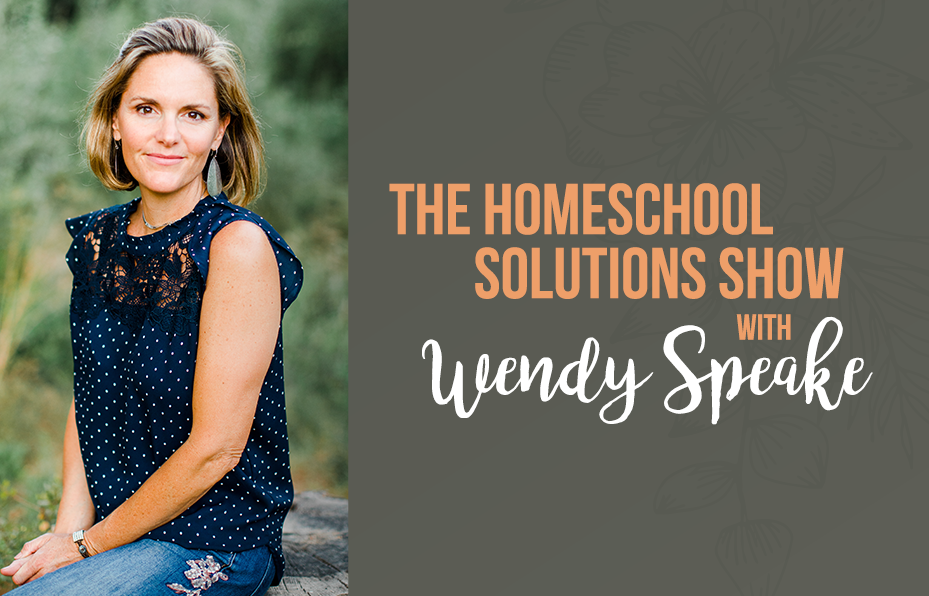HS 199: Why I Am Glad That I Homeschooled by Dr. Jay Wile
Links and Resources:
Show Transcript:
WENDY – Hey there, welcome to the Homeschool Solutions podcast. I’m your host, Wendy Speake.
Here on the podcast, we start each week with a longer, more traditional podcast, most often with guests but sometimes we simply open the Word together and apply it directly to our homeschooling days. On Thursdays, however, we share shorter episodes that I like to call blogcasts, where one of our favorite homeschool bloggers simply encourages us with the content of one of their recent blog posts. I hope this message serves you and your family today.
As always, I’d like to thank our sponsor, Sonlight curriculum. The wonderful people at Sonlight curriculum offer complete homeschool curriculum that you are guaranteed to love.
And now, let me introduce you to one of my friends.
DR. WILE - My name is Dr. Jay Wile and I have a Ph.D. in nuclear chemistry. I have taught on the faculties of Ball State University, Indiana University, and Anderson University. But I’m best known for the science textbooks I write geared towards home educators.
I was asked to read from my favorite blog article, and that was an easy one to choose. I wrote it about a year ago and it’s titled, Why I Am Glad That I Homeschool.
My little girl turns 40 this month. I’m not sure how to take that. In my mind, she’s still that 16-year-old girl who loved Dan Morino, computer games, and ice cream cake. Where in the world did the time go? As I think back on all the wonderful and not so wonderful times we have experienced together, I see a lot of mistakes that I have made in parenting her. There are definitely things I would do differently if I could turn back the clock to the day we adopted her. However, the one thing that I know I wouldn’t change is our decision to homeschool her.
We started homeschooling her as soon as we could, and the reason was simple. She was the classic example of a student who fell through the cracks. When she was having a good day, she learned well. When she wasn’t having a good day, she didn’t. As a result, there were large gaping holes in her education. Not surprisingly then, when she took the PSAT test, she scored in the bottom thirty-five percent of the nation in math. And the top twenty-five percent of the nation in English.
She wanted to get a college degree because as far as she knew, no one in her biological heritage had one. Getting a degree would provide a tangible break from her past. However, with those scores, she would have a difficult time getting accepted to college, much less succeeding when she got there. As a result, we spent most of her homeschooling in what I call educational triage. We identified the holes in her education and then we filled them. When she took the ACT, one of the standardized tests used for college entrance, early in her senior year, she scored in the top five percent of the nation in English and the top thirty percent in math.
As a scientist, I decided that the numbers were the ultimate evidence that the decision to homeschool her was a good one. She ended being accepted at Butler University and graduating with a degree in sociology, which of course, she doesn’t use.
In my mind, then, homeschooling was all about academics. Our daughter wanted a college degree and the only way we could prepare her for college was to homeschool her. Even after she’d graduated college, I still thought homeschooling her was all about academics. However, as time went on, my view of the matter began to change.
As I celebrated the successes in her adult life and helped her deal with the failures, I started to notice that our relationship was very different from the relationships that most of my friends had with their adult children. Our daughter actually wants to spend time, lots of time, with us. For example, right now she’s about to turn 40, and she’s on a mother-daughter vacation. When my wife suggested the idea to her, she was thrilled. At Christmas, I gave her a little picture book that had old and new photos of me, her, and my wife. When she opened it, her husband said, “Look at how her face just lit up!”
Why do I have a daughter who loves to spend time with me and her mother? If you ask her, it’s because we spent so much time together when she was young. In these days when children are separated from their parents by school, after school activities, and other distractions, it’s hard to form a deep family bond. When you homeschool, you’re not only using the best possible educational model to teach your child, but you’re also doing something very few families do. You are spending a lot of time together. In the long run, that makes a huge difference.
Does that mean everyone who homeschools will have a great relationship with their adult children? Of course not. There are many, many factors that play into how people bond with one another. However, probably the most crucial of all those factors is the time that you spend together. The more time you spend with your children, the better you get to know them.
Looking back at homeschooling my little girl, I recognize that she got an incredible education. More importantly, however, we all got an amazing gift. Lots of time to enjoy one another and grow closer together. Of all the wonderful things I can say about homeschooling, that is the most important.
I hope you enjoyed that blog article. If you’d like to read more, you can go to blog.drwile.com, that’s blog.drwile.com. Or, if you’d like to learn more about the science textbooks I’ve written for homeschoolers, you can go to my publisher’s website, bereanbuilders.com. That’s bereanbuilders.com.
WENDY – I hope that today’s blogcast equipped and encouraged you. Remember that next week I’ll be back with another great conversation right here on the Homeschool Solutions podcast. My name is Wendy Speake, I’m your host, and I am so glad that you tuned in today.
But before we sign off, I’d like to invite you to subscribe right now to the Homeschool Solutions podcast through Apple or Google Play. And speaking of invitations, won’t you join me at one of the Great Homeschool Conventions this year? These conventions are my favorite, offering dozens of wonderful speakers and hundreds of inspiring exhibitors. Go to greathomeschoolconventions.com and find one near you in 2020. This year I will be at the Ohio, Texas, South Carolina, and California conventions. Make sure to stop by and say hey if you’ll be at one of those events.
But in the meantime, we’ve got this podcast and Homeschooling.mom as other great resources to support you as you educate your kids in math and science and literature, yes, but also as you train them in Godliness and love.
Until next time, this is Wendy Speake. I hope that you and your family have a wonderful day.







